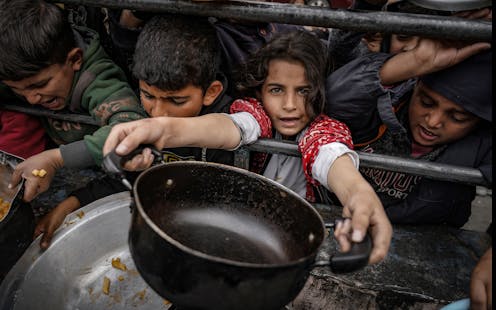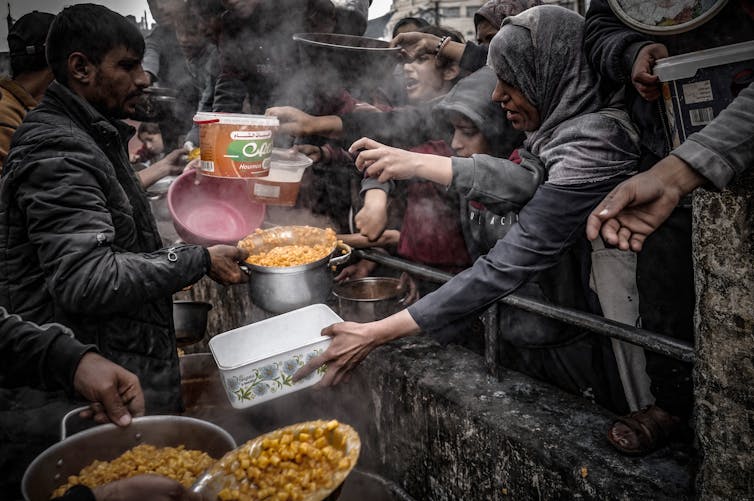
The stories of hunger emerging from war-ravaged Gaza are stark: People resorting to grinding barely edible cattle feed to make flour; desperate residents eating grass; reports of cats being hunted for food.
The numbers involved are just as despairing. The world’s major authority on food insecurity, the IPC Famine Review Committee, estimates that 90% of Gazans – some 2.08 million people – are facing acute food insecurity. Indeed, of the people facing imminent starvation in the world today, an estimated 95% are in Gaza.
As an expert in Palestinian public health, I fear the situation may not have hit its nadir. In January 2024, many of the top funders to UNRWA, the U.N.’s refugee agency that provides the bulk of services to Palestinians in Gaza, suspended donations to the agency in response to allegations that a dozen of the agency’s 30,000 employees were possibly involved in the Oct. 7, 2023, attack by Hamas. The agency has indicated that it will no longer be able to offer services starting in March and will lose its ability to distribute food and other vital supplies during that month.
With at least 28,000 people confirmed dead and an additional 68,000 injured, Israeli bombs have already had a catastrophic human cost in Gaza – starvation could be the next tragedy to befall the territory.
Indeed, two weeks after Israel initiated a massive military campaign in the Gaza Strip, Oxfam International reported that only around 2% of the usual amount of food was being delivered to residents in the territory. At the time, Sally Abi Khalil, Oxfam’s Middle East director, commented that “there can be no justification for using starvation as a weapon of war.” But four months later, the siege continues to restrict the distribution of adequate aid.
Table of Contents
Putting Palestinians ‘on a diet’
Israeli bombs have destroyed homes, bakeries, food production factories and grocery stores, making it harder for people in Gaza to offset the impact of the reduced imports of food.
But food insecurity in Gaza and the mechanisms that enable it did not start with Israel’s response to the Oct. 7 attack.
A U.N. report from 2022 found that a year before the latest war, 65% of Gazans were food insecure, defined as lacking regular access to enough safe and nutritious food.
Multiple factors contributed to this food insecurity, not least the blockade of Gaza imposed by Israel and enabled by Egypt since 2007. All items entering the Gaza Strip, including food, become subject to Israeli inspection, delay or denial.
Basic foodstuff was allowed, but because of delays at the border, it can spoil before it enters Gaza.
A 2009 investigation by Israeli newspaper Ha’aretz found that foods as varied as cherries, kiwi, almonds, pomegranates and chocolate were prohibited entirely.

Belal Khaled/Anadolu via Getty Images
At certain points, the blockade, which Israel claims is an unavoidable security measure, has been loosened to allow import of more foods; for example, in 2010 Israel started to permit potato chips, fruit juices, Coca-Cola and cookies.
By placing restrictions on food imports, Israel seems to be trying to put pressure on Hamas by making life difficult for the people in Gaza. In the words of one Israeli government adviser in 2006, “The idea is to put the Palestinians on a diet, but not to make them die of hunger.”
To enable this, the Israeli government commissioned a 2008 study to work out exactly how many calories Palestinians would need to avoid malnutrition. The report was released to the public only following a 2012 legal battle.
The blockade also increased food insecurity by preventing meaningful development of an economy in Gaza.
The U.N. cites the “excessive production and transaction costs and barriers to trade with the rest of the world” imposed by Israel as the primary cause of severe underdevelopment in the occupied territories, including Gaza. As a result, in late 2022 the unemployment rate in Gaza stood at around 50%. This, coupled with a steady increase in the cost of food, makes affording food difficult for many Gazan households, rendering them dependent on aid, which fluctuates frequently.
Hampering self-sufficency
More generally, the blockade and the multiple rounds of destruction of parts of the Gaza Strip have made food sovereignty in the territory nearly impossible.
Much of Gaza’s farmland is along the so-called “no-go zones,” which Israel had rendered inaccessible to Palestinians, who risk being shot if they attempt to access these areas.
Gaza’s fishermen are regularly shot at by Israeli gunboats if they venture farther in the Mediterranean Sea than Israel permits. Because the fish closer to the shore are smaller and less plentiful, the average income of a fisherman in Gaza has more than halved since 2017.
Meanwhile, much of the infrastructure needed for adequate food production – greenhouses, arable lands, orchards, livestock and food production facilities – have been destroyed or heavily damaged in various rounds of bombing in Gaza. And international donors have hesitated to hastily rebuild facilities when they cannot guarantee their investment will last more than a few years before being bombed again.
The latest siege has only further crippled the ability of Gaza to be food self-sufficient. By early December 2023, an estimated 22% of agricultural land had been destroyed, along with factories, farms, and water and sanitation facilities. And the full scale of the destruction may not be clear for months or years.
Meanwhile, Israel’s flooding of the tunnels under parts of the Gaza Strip with seawater risks killing remaining crops, leaving the land too salty and rendering it unstable and prone to sinkholes.
Starvation as weapon of war
Aside from the many health effects of starvation and malnutrition, especially on children, such conditions make people more vulnerable to disease – already a significant concern for those living in the overcrowded shelters where people have been forced to flee.
In response to the current hunger crisis in Gaza, Alex de Waal, author of “Mass Starvation: The History and Future of Famine,” has made clear: “While it may be possible to bomb a hospital by accident, it is not possible to create a famine by accident.” He argues that the war crime of starvation does not need to include outright famine – merely the act of depriving people of food, medicine and clean water is sufficient.
The use of starvation is strictly forbidden under the Geneva Conventions, a set of statutes that govern the laws of warfare. Starvation has been condemned by United Nations Resolution 2417, which decried the use of deprivation of food and basic needs of the civilian population and compelled parties in conflict to ensure full humanitarian access.
Human Rights Watch has already accused Israel of using starvation as a weapon of war, and as such it accuses the Israeli government of a war crime. The Israeli government in turn continues to blame Hamas for any loss of life in Gaza.
Yet untangling what Israel’s intentions may be – whether it is using starvation as a weapon of war, to force mass displacement, or if, as it claims, it is simply a byproduct of war – does little for the people on the ground in Gaza.
They require immediate intervention to stave off catastrophic outcomes. As one father in Gaza reported, “We are forced to eat one meal a day – the canned goods that we get from aid organizations. No one can afford to buy anything for his family. I see children here crying from hunger, including my own children.”
![]()
Yara M. Asi does not work for, consult, own shares in or receive funding from any company or organization that would benefit from this article, and has disclosed no relevant affiliations beyond their academic appointment.
























